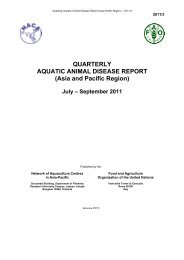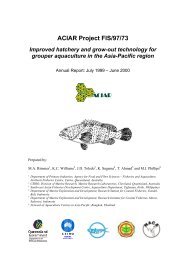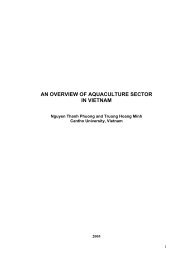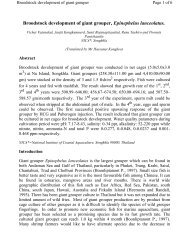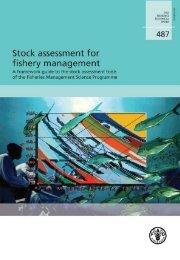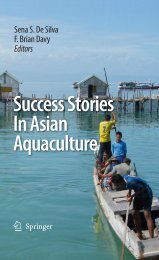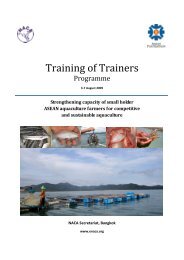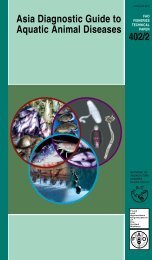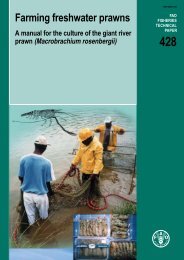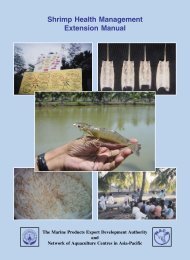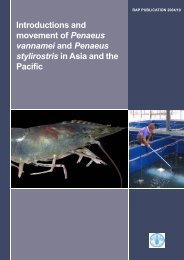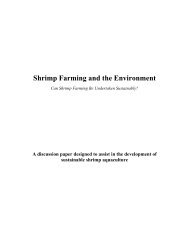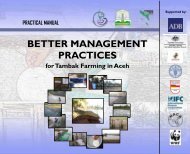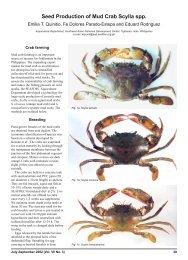State of World Fisheries and Aquaculture 2004 - Library
State of World Fisheries and Aquaculture 2004 - Library
State of World Fisheries and Aquaculture 2004 - Library
Create successful ePaper yourself
Turn your PDF publications into a flip-book with our unique Google optimized e-Paper software.
54<br />
The <strong>State</strong> <strong>of</strong> <strong>World</strong> <strong>Fisheries</strong> <strong>and</strong> <strong>Aquaculture</strong> <strong>2004</strong><br />
<br />
<br />
<br />
<br />
<br />
<br />
<br />
<br />
<br />
<br />
<br />
<br />
<br />
<strong>of</strong> these projects have <strong>of</strong>ten been unsatisfactory, largely because <strong>of</strong> inadequate<br />
importer–customer relationships, little or no advantage in terms <strong>of</strong> quality <strong>and</strong> price,<br />
<strong>and</strong> the failure <strong>of</strong> products to meet the needs <strong>of</strong> consumers – shortcomings resulting<br />
from inadequate market research. Experience has shown that the key to success lies in<br />
strong customer partnerships, sound market research, excellent quality <strong>of</strong> the product,<br />
reliability in supply, a constant drive for improvement, price competitiveness <strong>and</strong><br />
attractive packaging.<br />
In addition to value-addition <strong>and</strong> third-country processing in developing countries,<br />
other major issues concerning international trade in fish products that have been<br />
prominent in recent years include changes in quality <strong>and</strong> safety control measures in<br />
the main importing countries; the introduction <strong>of</strong> new labelling requirements <strong>and</strong><br />
the concept <strong>of</strong> traceability in major markets in developed countries; chemical residues<br />
in aquaculture products; the general public’s concern about overexploitation <strong>of</strong><br />
certain fish stocks, especially groundfish; the sustainable development <strong>of</strong> aquaculture,<br />
including its future feed requirements; IUU fishing; international trade negotiations<br />
in the WTO; the expansion <strong>of</strong> regional trade areas <strong>and</strong> the increasing number <strong>of</strong> new<br />
bilateral trade agreements. With the entry <strong>of</strong> China into the WTO in 2001, all major<br />
fishery countries other than the Russian Federation <strong>and</strong> Viet Nam (which have started<br />
negotiations to become members) are now members <strong>of</strong> the organization. Parallel<br />
to the increase in the WTO’s membership, a number <strong>of</strong> bilateral trade agreements<br />
with strong relevance to fish trade have been signed. The full impact <strong>and</strong> long-term<br />
effects <strong>of</strong> these agreements, in addition to or as a substitute for broader multilateral<br />
agreements, remain to be seen.<br />
Salmon<br />
2003 was a positive year for salmon producers <strong>and</strong> traders worldwide. Increased prices<br />
particularly benefited European producers in Irel<strong>and</strong> <strong>and</strong> the United Kingdom. Chile<br />
<strong>and</strong> Norway enjoy a comparatively lower cost structure <strong>and</strong> can operate pr<strong>of</strong>itably at<br />
lower price levels. They were therefore pr<strong>of</strong>itable in earlier years when the European<br />
industry generally was experiencing heavy losses. Chile, however, was to some extent<br />
hurt by a weaker dollar in the United <strong>State</strong>s, which is the major market for its fresh<br />
products.<br />
Tuna<br />
Japan is the top world market for sashimi-grade tuna. However, as in the case <strong>of</strong><br />
shrimp, dem<strong>and</strong> has declined in recent years or shifted to lower-priced species.



